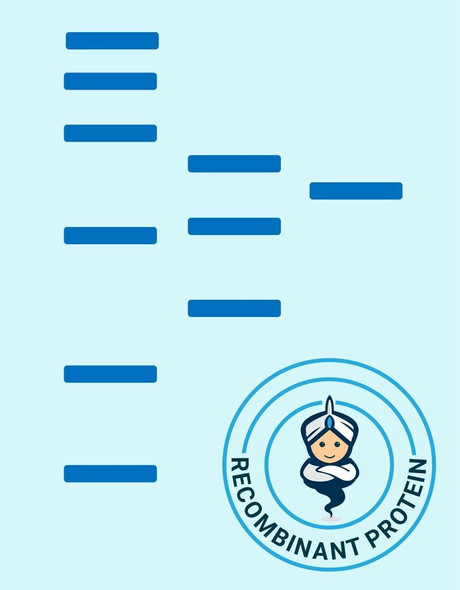Description
| Product Name: | Human CKB His Recombinant Protein |
| Product Code: | RPPB2480 |
| Size: | 20µg |
| Species: | Human |
| Target: | CKB His |
| Synonyms: | EC 2.7.3.2, Creatine kinase B chain, Creatine kinase B type, CKB, CKBBB, B-CK, Creatine Kinase Brain. |
| Source: | Escherichia Coli |
| Physical Appearance: | Sterile filtered colorless solution. |
| Formulation: | CKB Human solution containing 20mM Trsi pH-8, 1mM DTT, & 10% glycerol. |
| Stability: | CKB Human although stable at 4°C for 1 week, should be stored below -18°C. Please prevent freeze thaw cycles. |
| Purity: | Greater than 95.0% as determined by SDS-PAGE. |
| Amino Acid Sequence: | MGSSHHHHHH SSGLVPRGSH MPFSNSHNAL KLRFPAEDEF PDLSAHNNHM AKVLTPELYA ELRAKSTPSG FTLDDVIQTG VDNPGHPYIM TVGCVAGDEE SYEVFKDLFD PIIEDRHGGY KPSDEHKTDL NPDNLQGGDD LDPNYVLSSR VRTGRSIRGF CLPPHCSRGE RRAIEKLAVE ALSSLDGDLA GRYYALKSMT EAEQQQLIDD HFLFDKPVSP LLLASGMARD WPDARGIWHN DNKTFLVWVN EEDHLRVISM QKGGNMKEVF TRFCTGLTQI ETLFKSKDYE FMWNPHLGYI LTCPSNLGTG LRAGVHIKLP NLGKHEKFSE VLKRLRLQKR GTGGVDTAAV GGVFDVSNAD RLGFSEVELV QMVVDGVKLL IEMEQRLEQG QAIDDLMPAQ K |
CKB is a cytoplasmic enzyme that takes part in energy homeostasis. CKB enzyme reversibly catalyzes the transfer of phosphate among ATP and various phosphogens such as creatine phosphate. CKB functions as a homodimer in the brain as well as in different tissues, and as a heterodimer with a similar muscle isozyme in heart. Creatine kinases supply the energy of phosphate hydrolysis essential to drive the normal role of many cellular systems including muscle, tumor and cancer cells.
CKB Recombinant Human produced in E.Coli is a single, non-glycosylated polypeptide chain containing 401 amino acids (1-381 a.a.) and having a molecular mass of 44.8 kDa. The CKB is fused to 20 amino acid His-Tag at N-terminus and purified by proprietary chromatographic techniques.
| UniProt Protein Function: | Function: Reversibly catalyzes the transfer of phosphate between ATP and various phosphogens (e.g. creatine phosphate). Creatine kinase isoenzymes play a central role in energy transduction in tissues with large, fluctuating energy demands, such as skeletal muscle, heart, brain and spermatozoa. |
| UniProt Protein Details: | Catalytic activity: ATP + creatine = ADP + phosphocreatine. Subunit structure: Dimer of identical or non-identical chains. With MM being the major form in skeletal muscle and myocardium, MB existing in myocardium, and BB existing in many tissues, especially brain. Subcellular location: Cytoplasm. Sequence similarities: Belongs to the ATP:guanido phosphotransferase family.Contains 1 phosphagen kinase C-terminal domain.Contains 1 phosphagen kinase N-terminal domain. |
| NCBI Summary: | The protein encoded by this gene is a cytoplasmic enzyme involved in energy homeostasis. The encoded protein reversibly catalyzes the transfer of phosphate between ATP and various phosphogens such as creatine phosphate. It acts as a homodimer in brain as well as in other tissues, and as a heterodimer with a similar muscle isozyme in heart. The encoded protein is a member of the ATP:guanido phosphotransferase protein family. A pseudogene of this gene has been characterized. [provided by RefSeq] |
| UniProt Code: | P12277 |
| NCBI GenInfo Identifier: | 125294 |
| NCBI Gene ID: | 1152 |
| NCBI Accession: | P12277.1 |
| UniProt Secondary Accession: | P12277,Q2LE07, Q6FG40, Q9UC66, A8K236, B2R5R4, |
| UniProt Related Accession: | P12277 |
| Molecular Weight: | 42,644 Da |
| NCBI Full Name: | Creatine kinase B-type |
| NCBI Synonym Full Names: | creatine kinase, brain |
| NCBI Official Symbol: | CKB�� |
| NCBI Official Synonym Symbols: | B-CK; CKBB�� |
| NCBI Protein Information: | creatine kinase B-type; creatine kinase-B; creatine kinase B chain |
| UniProt Protein Name: | Creatine kinase B-type |
| UniProt Synonym Protein Names: | B-CK; Creatine kinase B chain |
| Protein Family: | Creatine kinase |
| UniProt Gene Name: | CKB�� |
| UniProt Entry Name: | KCRB_HUMAN |










